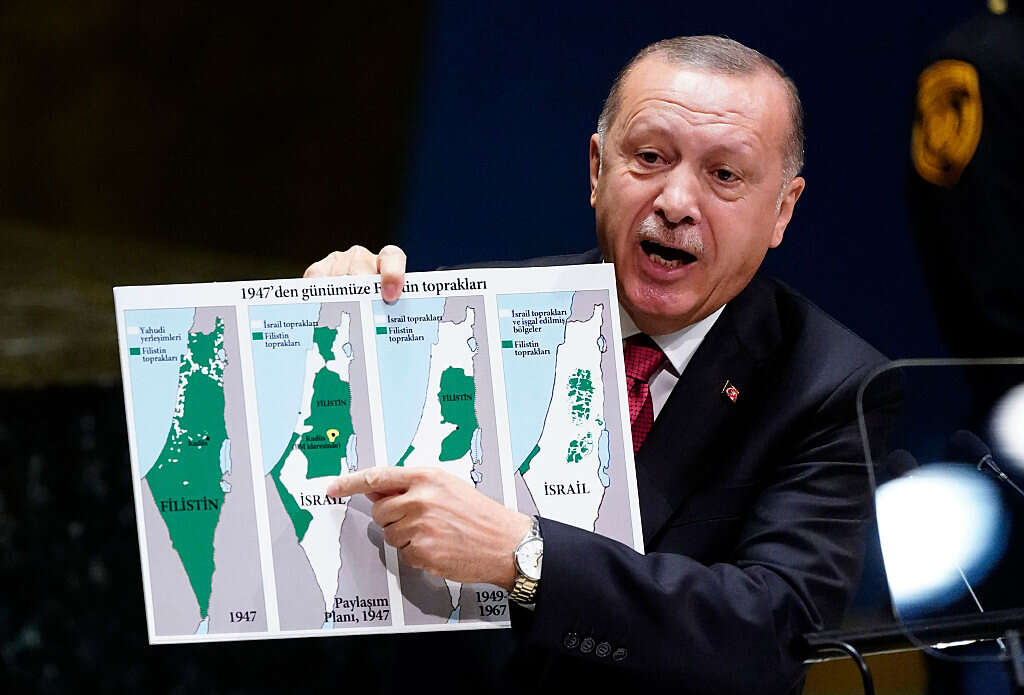Turkey's Jews are one of the oldest and grandest communities in the world. They have been dealing with the rule of Recep Tayyep Erdogan for 17 years now, and if until today their main source for concern was security, the past few months have added a difficult health challenge – coronavirus.
At the beginning of the 20th Century, the Turkish Jewish community was 300,000 strong, yet that number has dropped to only 17,000 this year, and the estimate is that those numbers will continue to drop in the years to come. Most of them live in the major cities, Istanbul and Izmir, while some live in others such as Antakya, next to Syria, and Bursa.
Follow Israel Hayom on Facebook and Twitter
"The death rate from the virus in the Jewish community is higher than their proportion in Turkey's population," says Karel Valensi?, a political analyst on the T24 website and the Jewish newspaper "Salom", "we lost dear friends in our community."
According to the official data in Turkey, 4,825 people have died from the virus, and in the Jewish community alone 15 people have passed away – including a synagogue cantor. Meaning, 0.32% of the deaths in Turkey are Jews, when they are only 0.02% of the population – 16 times higher. Meanwhile, Jews are finally enjoying the easing of some restrictions announced by the government – and last Shabbat synagogues reopened.
In fact, this community has no representation in parliament, which makes it difficult to further its interests. The last Jewish member of parliament was Cefi Kamhi, who served between 1995-1999 – and even then, he abstained on important votes due to fears of anti–Semitism.
"The Jews are afraid of the government just like all of Turkey's citizens," explains Dr. Hay Eytan Cohen Yanarocak, an expert on contemporary Turkish politics and foreign policy at the Jerusalem Institute for Strategy and Security and Tel Aviv University.
He adds that "if they speak against the government – they may retaliate. All citizens are in their crosshairs." The hope in all of Turkey is that the political change that took place last year, with the defeat of the Justice and Development (AK) party in local elections, will gain momentum ahead of the general elections in three years.
"We were surprised," Valensi? admits. The results in the local elections, she says, "showed that the power and authority of President Erdogan are not infinite."
"Coronavirus positively affected Turkish–Israeli relations, both directly and indirectly," says Dr. Umut Koldas, founder of the Near East Institute in the Near East University in Northern Nicosia – the capital of Turkish Cyprus. The virus, he says, "provided tangible proof that both states can cooperate, by allowing an El Al plane to land in Istanbul, and diplomatic proclamations. Indirectly, it created opportunities for an alternative gas transport route between Israel and Turkey – even through Turkish Cyprus."
"There are indications of a possible thawing in Turkish–Israel relations, but it's not necessarily because of the virus," says Guney Yildiz, an analyst with the BBC and doctoral student at Cambridge University. The main reason, he says, is that "relations with Israel received positive coverage across Turkish media, including since the beginning of the pandemic."
Yildiz adds that there are unconfirmed rumors, which have not been denied, that senior Turkish and Israeli officials negotiated to reach a deal over the maritime borders of both states. "Turkey is trying to find oil and gas in disputed areas," the BBC analyst says of the actions the Erdogan government is taking in Cyprus' territorial waters. "If Ankara manages not to turn Israel hostile to those plans, it will be a great victory for Turkish diplomacy."

But what never ends in Turkey is anti–Semitism.
In a report written by Dr. Cohen Yanarocak for the Konrad Adenauer Foundation in Israel, he shows that Turkish citizens have marked the Chinese and Syrians as the virus spreaders, and the Jews as the "rich owners of the pharmaceutical companies trying to make money off of the virus."
When it comes to ties with Israel, Guney Yildiz thinks Turkish public opinion is affected by two things: First of all, the stance of the government, and second, "conspiracy theories and prejudices on Judaism and the Jewish people due to the Turkish religious perspective." In his opinion, "changing the tone of the discussion in government could help a lot. In this context, the Erdogan government is not making it easy for the Jewish people. Even if there is a rapprochement between Israel and Erdogan, the president will not want it to be public."
In an effort to understand Erdogan in general and his treatment of Turkey's Jews, it's best to understand the basis of his platform, "neo–Ottomanism", which aims at returning Turkey to its position as a regional power. His actions in Jerusalem, which were revealed by Israel Hayom, are part of this manifesto. One of the Israelis who knows the Turkish president best these days is the former ambassador from 2003–2007 and former Deputy Director General of the Foreign Ministry, Pinchas Avivi.
"The regime in Ankara separates between how it handles Turkish Jews and Israel. However, I think the community doesn't feel it," the former ambassador says and claims that "they're very scared to speak and publicly show any sympathy for Israel. During all my time there I even saw Jews help Erdogan financially to ensure his treatment of them."
As a result of his relationship with Erdogan he heard from the Turkish president directly that "the ties with world Jewry are very important to him. He is proud of the fact that the Ottoman empire opened its gates to the Jews expelled from Spain. We should remember that Erdogan objects to Israel as a political entity, he sees neo–Ottomanism as the basis for bringing back the Ottoman empire. He doesn't hate Jews, it's Israel he hates to death, and the essence that the Jewish state has today in the heart of the most sacred sites for the Muslim world."
The BBC analyst Yildiz adds that "anti–Semitism is not only a trait of religious people in Turkey, but also secular." The secular anti–Semitism in Turkey, he says, "is laden with prejudice and feelings against Israel that are in essence a cover to that same anti–Semitism."
'Erdogan is trying to not be perceived as anti–Semitic'
Dr. Cohen Yanarocak says that "Erdogan is trying to not be perceived as anti–Semitic." During the year of the Marmara incident in 2010, for example, renovation began on the large synagogue in the city of Edirne, the largest in the Balkans and the third–largest in Europe. A massive renovation, costing $1.7 million, which finished only in 2015, even though the Jewish community in the city no longer exists.
On the other hand, according to a senior researcher, "in 2017 when there was tension over the metal detectors on the Temple Mount, Erdogan said: 'We may take similar steps,' drawing attention to synagogues in Turkey. Furthermore, when he said: 'We must not behave like the Jews in Israel, because they kick those who are down – we're not like that.'"
Another issue that unites the Turkish public opinion is the army and support for it, especially during Operation Peace Spring over the last few months in northern Syria against the Kurds. While there are Jews serving in the Turkish army, they apparently don't take part in this operation, since special units in which they are not integrated are positioned there.
"Syria is a hostile entity for both Turkey and Israel," says Dr. Koldas, "with the new government in Israel and a different foreign policy towards Turkey, and with a change in Turkish foreign policy towards Israel, I presume the diplomatic ties will quickly strengthen and embassies will return to normal work before the end of the year."
Another issue that affects the Jews – being a part of the wider Turkish society – is the economic slump. "The pandemic returned the country to the severe financial crisis it was in two years ago," says Dr. Cohen Yanarocak, "the Turkish Lira reached 7.2 to the dollar." On the other hand, the former ambassador Avivi sees the virus as an "opportunity for Israel."

"Even when I was ambassador we made it clear to the Turks that we want the lives of Palestinians to be good, and now as well," explains Avivi. "At that time, despite the problems, there was also excellent cooperation with Erdogan and his people specifically. The moment he came to power we understood that security cooperation with Turkey will not continue, so we focused on improving economic ties, and these spiked from $1 billion to $5.5. billion."
Subscribe to Israel Hayom's daily newsletter and never miss our top stories!
Meanwhile, Turkish Jews won't say it openly but their hope for changes rests in the former Deputy Prime Minister and Foreign Minister Ali Babacan. The senior politician left the Justice and Development party last year, and, as opposed to the former prime minister Ahmet Davutoglu who supports neo–Ottomanism without Erdogan, he believes Turkey must go back to being a pro–Western country. For that goal, he founded last March the Democracy and Progress party (DEVA). "The community leaders prefer the Jewish community to remain invisible," says the BBC analyst Yildiz. However, he adds that "Turkish Jews prefer a secular policy over the policy of the Justice and Development party."
As part of the restrictions on democracy, Erdogan is making it difficult for him to get exposure in the local media. So, Babacan is using YouTube broadcasts that get millions of views. In one of his propaganda videos, where he presents his excellent ties with leading figures of the West, even Shimon Peres appears. "Besides the goal of returning to the West, Babacan also calls for the release of prisoners in jail as a result of the damages to freedom of speech," says Dr. Cohen Yanarocak.
The final blow to Erdogan's rule may come from a union between Babacan and the Republican People's Party (CHP). Ambassador Avivi has harsh words not only for the Turkish president, but also for the opposition. "While the high threshold prevents a party with under 9.9% from entering parliament," he explains, "the split opposition, whose combined power is greater than that of Erdogan's – causes it to consistently lose. That's because they have not agreed upon a leader."




